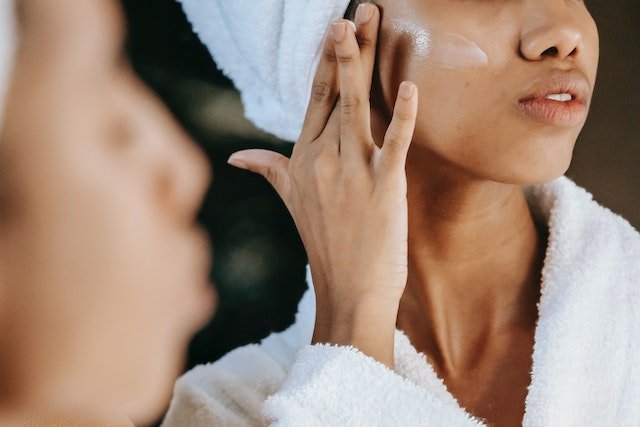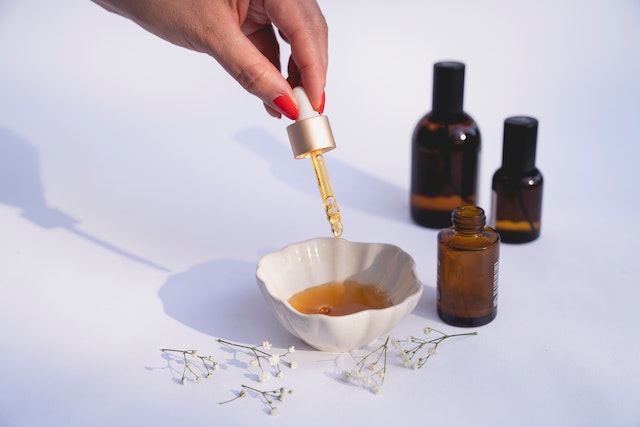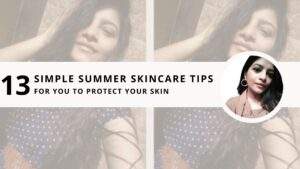These 12 Skincare Myths have been around as long as skincare itself. Sometimes they are passed down to us from our mothers and grandmothers and sometimes they are just the results of the marketing tactics that go around the skincare products. The question is, how many of these are true?
Skincare and self care are subjects that often come with a myriad of myths and misconceptions. In the quest for healthy and radiant skin, it’s important that you separate fact from fiction and make informed decisions about your skincare routines.
To help you navigate through the sea of misinformation, I have debunked some of the most common skincare myths circulating around. Because we hear them so often, we end up accepting them as reality. However, the world is filled with ‘beautiful lies’. Just because everyone else seems to believe them, that is a pretty silly reason to accept them as truth for yourself. So, grab your favorite sheet mask and get ready to unveil the truth behind these quirky beliefs.
12 Annoying Skincare Myths You Should Not Fall For
1. Skincare Myths: Expensive is Effective
I have never understood how expensive is synonymous with the right product when it comes to skincare. There are different types of skin and not every product is suitable for every skin. You should buy skincare products based on your skin type. And, if you wish to be more economical, you can try DIY solutions. Price does not always determine the effectiveness of skincare products. While some high-end products may offer luxurious packaging and exotic ingredients, affordable options can also deliver excellent results.
The key is to find products that suit your skin type and address your specific concerns. Look for well-formulated products with ingredients proven to be effective, regardless of their price tag. Because expensive is not always equal to effective.
2. Skincare Myths: Wrinkles Can Be Erased
I haven’t heard of a skincare myth more bizarre than this. Having wrinkles is one of the many rules of nature, that’s how you grow as a person. There’s nothing that can defy it.
Yes, a good anti-aging product may help you reduce the appearance of fine lines and wrinkles. But, it cannot remove them completely. You may use products composed of retinoids to lighten them as they are scientifically proven to reduce wrinkles.

3. Skincare Myths: You Don’t Need Sunscreen While Working Indoors
Sunscreen is important to protect your skin from the direct, harmful UV rays of the sun. They can penetrate through the clouds and damage your skin, even on a cloudy, overcast day. It is crucial to wear sunscreen every day, regardless of the weather conditions.
UV rays damage your skin to a serious extent. Hence, even when you are indoors, make sure you use a moisturizer with SPF or SPF30+. They will protect your skin from both UVA and UVB. If you’re spending time outdoors, make sure you don’t forget to reapply sunscreen every two hours.
4. Skincare Myths: Waxing or Shaving Leads to Thicker Hair Growth
This is the one skincare myth even I fell for. I used to believe that hair removal causes thicker hair growth. But, removing hair by waxing or shaving doesn’t lead to thicker hair of growth. Instead, waxing leads to thinning out the hair growth with time because constantly pulling out the hair leads to weakening the hair roots. And, shaving causes the hair ends to taper. Hence, making them softer and thinner.
5. Skincare Myths: Drinking Water Keeps the Skin Hydrated
There’s no scientific evidence to support the positive effects of drinking water on the skin. The water we drink doesn’t get directly absorbed by the skin to benefit it.
To have healthy skin, it is important to keep the skin nourished and moisturized. And as much as for all skin products, it is important to eat food that promotes clear and glowing skin. Also if you have dry skin, using a moisturizer always helps.
6. Skincare Myths: Not Washing the Face Causes Acne
Acne is the result of overproduction of sebum, an oily substance secreted by the skin. Some other causes may be bacteria, clogged pores, and inflammation. Your genetics, skin care habits, everyday stress, and hormonal changes also play a very significant role in the development of acne.
Other than this, while a balanced diet is essential for overall skin health, specific foods do not directly cause breakouts. However, not washing your face does not have any role in the development of acne on our face.
7. Skincare Myths: Skincare products can cure acne overnight
Acne is a complex skin condition that requires consistent efforts and long-term treatment. While skincare products can help manage and improve acne, none of them can magically cure it overnight.
Patience and persistence are key when dealing with acne. Stick to a skincare routine that includes proven acne-fighting ingredients like salicylic acid and benzoyl peroxide. And instead of blindly following every other beauty hack you see online, make sure you consult with a dermatologist for personalized care and treatment options.
8. Skincare Myths: Exfoliators Should Be Used Every Day
No, face scrubs or exfoliators, if used at all, must be used twice or thrice a week. The use of exfoliators is dependent on the skin type. Over-exfoliation can damage your skin’s natural oils and lead to dryness, irritation, and increased sensitivity. It can even cause acne and breakouts.
Thus, it’s recommended to exfoliate 1-2 times per week using gentle, chemical exfoliants that promote cell turnover without harming your skin. Remember to avoid any harsh, physical scrubs that can create micro-tears in the skin and increase the existing skin conditions. You can even choose to not use exfoliators at all since the skin naturally sheds its superficial keratinocytes at least once a month.
9. Skincare Myths: Organic Products Are Safe for All Skin Types
Again, not a necessity. And again, it depends on the type and condition of your skin. While natural ingredients are beneficial for the skin, not all natural skincare products are made to fit all skin types. Just because it’s natural or organic doesn’t guarantee betterment for the skin. These products are often regulated and may contain allergic elements for the skin type. Not all things natural are beneficial.
While some natural substances can be irritating or allergenic, some synthetic ingredients have been extensively researched and proven to be safe and effective. It’s essential to focus on the quality and formulation of your chosen skincare products rather than solely relying on whether they contain natural ingredients or not.
10. Skincare Myths: Skincare products can fix all of your skin problems
While skincare products can improve the appearance of your skin and address specific concerns, they cannot single-handedly fix all skin problems. Factors like genetics, lifestyle, and overall health also play significant roles in the health and appearance of your skin. It’s essential to adopt a holistic approach to skincare, including a healthy lifestyle, proper nutrition, and consistent skincare routines.
11. Skincare Myths: Oily Skin Doesn’t Need Moisturizer
It’s a common skincare myth that oily skin doesn’t require moisturizer. In reality, all skin types, including oily skin, benefit from moisturization. Just because it’s oily skin doesn’t make its need for moisturization any less. After washing and cleaning the face, the skin wears off the natural oils. Therefore, to put that moisture back into the skin, it is equally necessary to use a moisturizer even for oily skin.
Skipping moisturizer can leave your skin dehydrated which triggers the sebaceous glands in your skin to produce more oil, increasing the issue. Hence, if you have oily skin you can opt for lightweight, non-comedogenic moisturizers that provide hydration without clogging the pores. Also, it won’t irritate your skin as well.
12. Skincare Myths: A Strict Skincare Regime with Exclusive Products is Necessary
Using excessive amounts of skincare products does not guarantee better results. In fact, it can be counterproductive and lead to skin irritation or breakouts. Your skincare routine doesn’t have to be luxurious or exquisite just because everyone else is doing it. Keep it minimal, use the products as per your skin type, and follow the recommended guidelines if needed. Remember, more is not always better, especially when it comes to your skin.
Also, yes a skincare routine is important. But you don’t have to be strict about it. Skincare as part of our self-care practices is important, but it doesn’t have to be forced. It should happen at self-pace. You should not force yourself to get a face massage or wear a mask until you feel like it.
Conclusion
By debunking these skincare myths, I hope to empower you to make informed decisions and optimize your skincare routine.
Remember, everyone’s skin is unique, and what works for someone else may or may not work for you. It’s essential that you listen to your skin, understand its needs, and consult with a skincare professional if necessary.
With a combination of proper skin care practices, a healthy lifestyle, and a dose of patience, you can achieve healthy and radiant skin that lasts a lifetime.
Skincare is a big part of personal care. Hence, it’s a personal choice. Also, you should practice skincare adhering to your skin condition and type.
Skincare is not about using a whole lot of products and experimenting now and then. Consecutively experimenting with skincare products can cause damage your skin.
I practice my skincare routine once or twice a month. And, it works fine for me. It might be different for you.
So, cater to the needs of your skin and ignore these skincare myths. Also, when you happen to use a new skincare product, take note of how your skin reacts to it and then decide on its future use.
I’ll see you with a new blog next week. I hope you had a good time busting these skincare myths with me.
I’ll see you soon.
Stay safe, bye.




